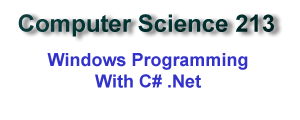 |
|
S p r i n g 2 0 1 8
Ticket #
48554
Updated 1/29/2018
|
Instructor: Telephone: E-mail: Web Site: Office hours: Textbook: |
Ronald P. Kessler, Ph.D., MCSE 714.628.4754 rpkessler@hotmail.com http://www.rkessler.com See schedule |
|||||||||||||||||||||
 |
Murach's C# 2015 by Joel Murach and Anne Boehm 26 chapters, 850 pages, 372 illustrations Published January 2016 ISBN 978-1-890774-94-3 |
|||||||||||||||||||||
|
Introduction to C# programming is designed to help you learn how to create programs for Microsoft® Windows. Some experience with Visual Studio will certainly help you learn C#. I want you to become familiar with the terminology and the use of C# so that you can develop the skills necessary to learn programming as either a hobby or a future career. A good deal of emphasis this semester will be placed upon the creation of Windows programs in order to demonstrate how to solve real-world problems with today’s technology. I designed this course for students who have experience with Visual Basic.Net and want to learn a second language. I also welcome people who have never designed a computer program before. Please be advised, that learning to program in C# is considerably more difficult than learning with VB first. If you have never programmed, you should take CS 105 first! Evaluation Your final grade in my class will be based on the total number of points you earn. The grade which you earn will be based upon the total amount of points you receive on the homework, quizzes, and exams. Grading will be based upon the following criteria: 90%= A The total possible points in the course will be approximately as follows:
Class
Format (In Class) I will be available after class to help you or give you extra time to work. It is always possible to meet before class if you arrange that with me ahead of time.
Class Drops
Accommodations for Disabilities MAKE-UP EXAMS It is possible to take a make-up exam or quiz during the semester (EXCLUDING THE FINAL) if the exam is missed due to illness or other emergency. Please contact me right away if you cannot attend class when we are having an exam so I can help you with the best solution for your situation. Student Code of Conduct/Civility/Cell Phones/Internet Use
Plagiarism You are encouraged to work with other students in the class, but all work that you turn in for grading must be your own. Taking credit for another students work is plagiarism and is a violation of SCC academic policy. You will be reported for academic dishonesty. Don't let this happen to you! Remember, all work that you turn in for grading must be your original work. Specific Student Learning Outcomes
The number of projects and the points possible for exams, projects and activities are subject to change without notice. This information is intended to be an accurate overview of this course so you will know what to expect during the semester. But sometimes, we will need to modify this plan. The Rancho Santiago Community College District is happy to provide reasonable accommodations for students with disabilities. It is your responsibility to inform me if you have such needs.
|
||||||||||||||||||||||
